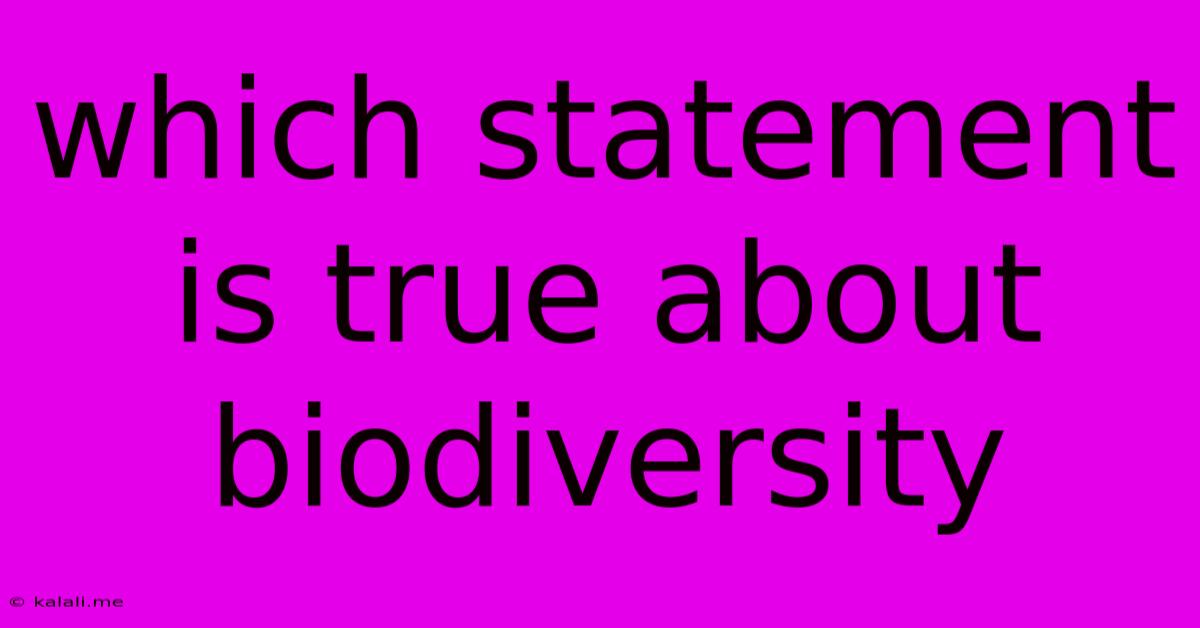Which Statement Is True About Biodiversity
Kalali
Jun 15, 2025 · 3 min read

Table of Contents
Which Statement is True About Biodiversity? Unveiling the Importance of Life's Variety
Biodiversity, the incredible variety of life on Earth, is a complex and multifaceted topic. Understanding its intricacies is crucial for appreciating its importance and for implementing effective conservation strategies. This article explores several common statements about biodiversity and clarifies which ones accurately reflect the scientific consensus. We'll delve into the significance of biodiversity, its impact on ecosystem services, and the threats it currently faces.
What is Biodiversity?
Before we examine the truth of various statements, let's define biodiversity. It encompasses the variety of life at all levels, from genes to ecosystems. This includes:
- Genetic diversity: The variation in genes within a species.
- Species diversity: The number and abundance of different species in a given area.
- Ecosystem diversity: The variety of habitats, communities, and ecological processes.
Evaluating Statements About Biodiversity:
Now, let's analyze some common statements about biodiversity and determine their accuracy:
Statement 1: Biodiversity is only about the number of species present in an area.
FALSE. While species richness (the number of species) is a crucial component, biodiversity is much broader. It encompasses genetic diversity within species and the diversity of ecosystems themselves. A high number of species doesn't necessarily equate to high biodiversity if genetic diversity within those species is low, or if the ecosystem is homogenous.
Statement 2: Biodiversity is important only for aesthetic reasons.
FALSE. While the beauty and wonder of nature are certainly reasons to value biodiversity, its importance extends far beyond aesthetics. Biodiversity underpins numerous ecosystem services vital to human well-being, such as:
- Clean air and water: Diverse ecosystems play a crucial role in purifying air and water.
- Pollination: Many crops rely on insect and animal pollination for successful reproduction.
- Climate regulation: Forests and oceans absorb significant amounts of carbon dioxide, mitigating climate change.
- Soil fertility: Diverse soil organisms enhance soil health and fertility.
- Medicine and resources: Many pharmaceuticals and other resources originate from biodiversity.
Statement 3: Loss of biodiversity has no significant impact on humans.
FALSE. The loss of biodiversity has profound consequences for humans. The decline in ecosystem services directly impacts food security, water availability, human health, and economic stability. For example, the collapse of pollinating insect populations could lead to significant crop failures.
Statement 4: Biodiversity is a static concept; it doesn't change over time.
FALSE. Biodiversity is dynamic and constantly changing due to natural processes like evolution and environmental fluctuations. However, the current rate of biodiversity loss, largely driven by human activities, is far exceeding the natural rate of change, causing significant disruption to ecosystems.
Statement 5: Protecting biodiversity requires large-scale conservation efforts only.
FALSE. While large-scale conservation initiatives are vital, protecting biodiversity also requires individual actions. Sustainable practices in agriculture, responsible consumption, reducing carbon footprint, and supporting conservation organizations are all crucial steps.
Conclusion:
Biodiversity is a complex and crucial aspect of our planet. Understanding its multifaceted nature and the interconnectedness of its various components is vital for effective conservation. The accurate statement is that biodiversity encompasses genetic diversity, species diversity, and ecosystem diversity, and its loss has profound and far-reaching consequences for human well-being and the planet's health. Protecting biodiversity requires a multi-pronged approach involving both large-scale initiatives and individual actions.
Latest Posts
Latest Posts
-
How Many Tablespoons In A Ranch Seasoning Packet
Jul 31, 2025
-
How Many Cubic In In A Gallon
Jul 31, 2025
-
Does Elphaba Die In Wizard Of Oz
Jul 31, 2025
-
Lyrics For Hot Dog Song Mickey Mouse
Jul 31, 2025
-
How Many Milligrams Are In 8 Grams
Jul 31, 2025
Related Post
Thank you for visiting our website which covers about Which Statement Is True About Biodiversity . We hope the information provided has been useful to you. Feel free to contact us if you have any questions or need further assistance. See you next time and don't miss to bookmark.